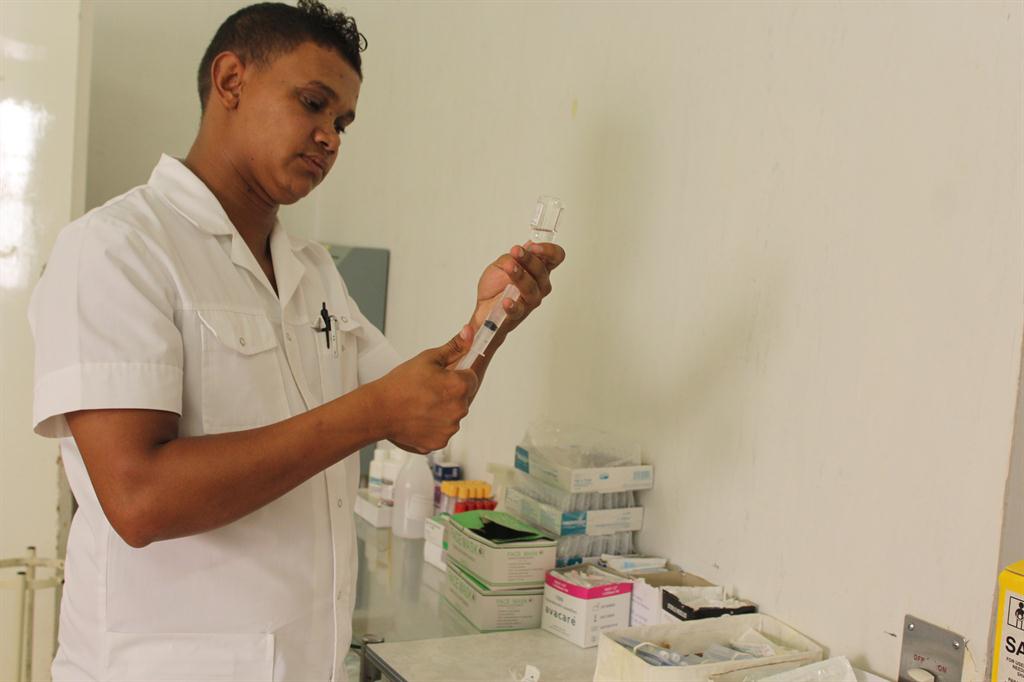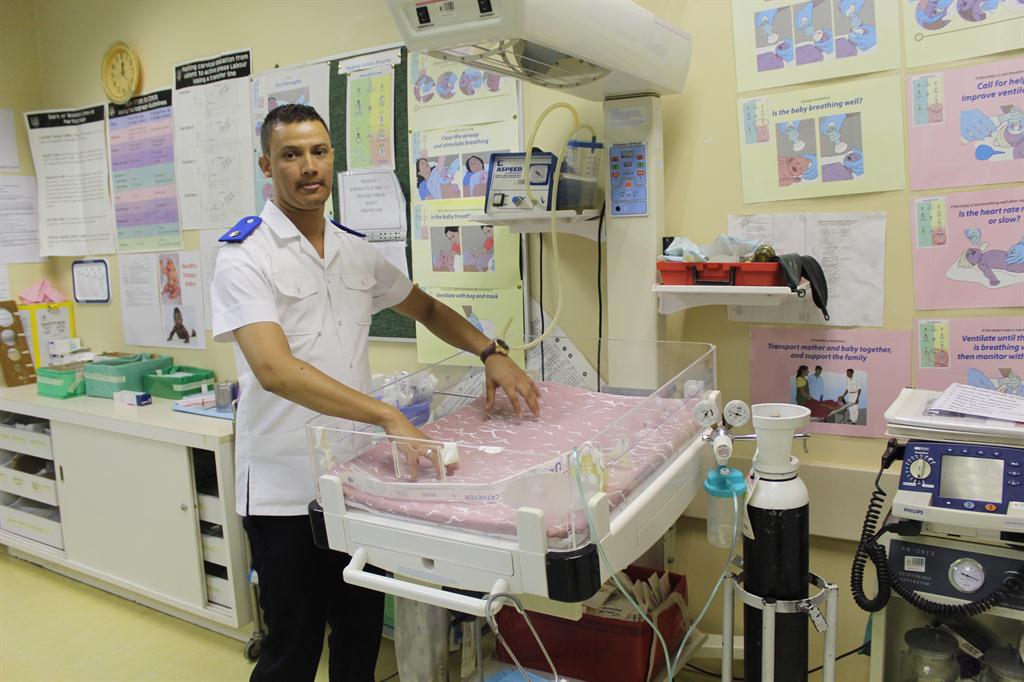Meet the male midwives
A little unexpected when one is giving birth but by no means lesser in care or skill... met the brothers who are both qualified, practising midwives.
Monroy Jeftha and his brother, Convyne, are a rare breed of young male midwives who have marched into the country’s maternity wards to confront the African stereotype that men cannot deliver babies, head-on.
The siblings are working at the St Mary’s Hospital in Rehoboth in the Hardap Region.
Convyne started working in 2014 and Monroy in 2016.
Although both of them have since moved into other wards, they still lend a helping hand in the maternity ward.
Monroy, who is the younger of the two, has become a familiar face in the emergency section of the hospital, while Convyne also helps out in the private ward.
As Convyne puts it: “People often die in emergency rooms and in the wards, but in the maternity ward every day is filled with joy because it brings new life.”
The brothers grew up in Klein Aub, which is a village in the Hardap Region, and moved to Rehoboth where they completed their schooling at MK Gertze.
From there they enrolled at the Keetmanshoop regional health training centre.
Asked what sparked their interest in the profession, Convyne said he wanted to become a doctor or a veterinarian, but there was no money, so he took up the next best thing and eventually inspired his little brother.
Firm but gentle
Monroy, who is widely known by most mothers in Rehoboth for his firm, yet gentleness, said he has lost count of how many babies he has delivered, but remembers delivering four babies on one day as a student.
“We are obviously well-prepared to handle difficult deliveries, but my most tiring delivery was when we had a ‘face to pubis’, which was very difficult and we really suffered… but the baby was delivered and she is walking around. In fact, I treated her in the emergency room the other day,” he says while smiling.
He relates how people stop in shop aisles to show him ‘his’ baby or call to him in the street, so they can show him how big their baby has grown.
Convyne who delivered three babies in one day said his most difficult delivery was a breech birth.
“The head was stuck and by the time the baby came out it already fainted, but we pushed through and the baby is alive and well,” he said.
Convyne has already ticked off the B1 highway, a taxi and the hospital driveway as places he has delivered babies.
Dangerous births
He often assists at the Klein Aub clinic when he is on leave.
“It really gets rough in this business. I was called out one morning to a shack in the informal settlement in the dunes. When we arrived there the baby was already outside and the shack had no floors. It was in the heart of winter and the baby went into hypothermia, but we managed to get it warm again and back to the hospital,” he related.
Hypothermia occurs when the body can no longer release enough of its heat to maintain a normal temperature.
Asked whether they had ever lost a child or mother during a delivery, both said “no”.
“We obviously get stillbirths, but we have not had a mother or child die during a delivery,” said Monroy.
Both said a golden rule was instilled by their former lecturer Stephanus Claassen, who always thundered: “You may not lose this mother or baby at all costs.”
They said they are surrounded on a daily basis by several mentors, including veteran nurses with 40 years’ service under their belts.
The right attitude
Monroy said he has now developed a passion for the emergency room and will specialise in trauma cases, once he has saved up enough for his studies.
“I can tell you we get really busy there and people are difficult, especially on weekends when drunk people come in with stab wounds. Then you have plead with him to lie still so that you can save their lives,” he said.
On other days, Monroy relates, people come in and say they are happy to be treated by him again.
“I have learned that the right attitude breeds the right response. If you are rude with a patient their blood pressure goes up and then you sit with a bigger problem. Obviously some patients come to the hospital with an already fixed aggression, but even then you can only be friendly,” he said.
Convyne lives by the rule that nothing is a crisis.
“Obviously the hospital is a place where people die, but as a nurse you cannot fret over the sight of death. You will go mad,” he said.
Stereotypes
He also believes that sometimes one needs to pack away the theory and use logic to solve a problem.
Monroy said being a nurse has made him more responsible, as he realises he has become a public figure.
“We are normal people, we play soccer and we hang out with friends. But I cannot be drinking myself drunk and blackout on a pavement and expect to be trusted when I treat a patient the next day,” he said.
According to Convyne they face the usual stereotypes and have been told by a patient that her boyfriend is not happy that he examined her.
“But I told her firmly that if he has a problem then he must do it according to the laws of the country. I also had an incident where a man told me he will not allow me to examine his wife, but I had to educate him gently, so he understood and gave in.”
JEMIMA BEUKES
The siblings are working at the St Mary’s Hospital in Rehoboth in the Hardap Region.
Convyne started working in 2014 and Monroy in 2016.
Although both of them have since moved into other wards, they still lend a helping hand in the maternity ward.
Monroy, who is the younger of the two, has become a familiar face in the emergency section of the hospital, while Convyne also helps out in the private ward.
As Convyne puts it: “People often die in emergency rooms and in the wards, but in the maternity ward every day is filled with joy because it brings new life.”
The brothers grew up in Klein Aub, which is a village in the Hardap Region, and moved to Rehoboth where they completed their schooling at MK Gertze.
From there they enrolled at the Keetmanshoop regional health training centre.
Asked what sparked their interest in the profession, Convyne said he wanted to become a doctor or a veterinarian, but there was no money, so he took up the next best thing and eventually inspired his little brother.
Firm but gentle
Monroy, who is widely known by most mothers in Rehoboth for his firm, yet gentleness, said he has lost count of how many babies he has delivered, but remembers delivering four babies on one day as a student.
“We are obviously well-prepared to handle difficult deliveries, but my most tiring delivery was when we had a ‘face to pubis’, which was very difficult and we really suffered… but the baby was delivered and she is walking around. In fact, I treated her in the emergency room the other day,” he says while smiling.
He relates how people stop in shop aisles to show him ‘his’ baby or call to him in the street, so they can show him how big their baby has grown.
Convyne who delivered three babies in one day said his most difficult delivery was a breech birth.
“The head was stuck and by the time the baby came out it already fainted, but we pushed through and the baby is alive and well,” he said.
Convyne has already ticked off the B1 highway, a taxi and the hospital driveway as places he has delivered babies.
Dangerous births
He often assists at the Klein Aub clinic when he is on leave.
“It really gets rough in this business. I was called out one morning to a shack in the informal settlement in the dunes. When we arrived there the baby was already outside and the shack had no floors. It was in the heart of winter and the baby went into hypothermia, but we managed to get it warm again and back to the hospital,” he related.
Hypothermia occurs when the body can no longer release enough of its heat to maintain a normal temperature.
Asked whether they had ever lost a child or mother during a delivery, both said “no”.
“We obviously get stillbirths, but we have not had a mother or child die during a delivery,” said Monroy.
Both said a golden rule was instilled by their former lecturer Stephanus Claassen, who always thundered: “You may not lose this mother or baby at all costs.”
They said they are surrounded on a daily basis by several mentors, including veteran nurses with 40 years’ service under their belts.
The right attitude
Monroy said he has now developed a passion for the emergency room and will specialise in trauma cases, once he has saved up enough for his studies.
“I can tell you we get really busy there and people are difficult, especially on weekends when drunk people come in with stab wounds. Then you have plead with him to lie still so that you can save their lives,” he said.
On other days, Monroy relates, people come in and say they are happy to be treated by him again.
“I have learned that the right attitude breeds the right response. If you are rude with a patient their blood pressure goes up and then you sit with a bigger problem. Obviously some patients come to the hospital with an already fixed aggression, but even then you can only be friendly,” he said.
Convyne lives by the rule that nothing is a crisis.
“Obviously the hospital is a place where people die, but as a nurse you cannot fret over the sight of death. You will go mad,” he said.
Stereotypes
He also believes that sometimes one needs to pack away the theory and use logic to solve a problem.
Monroy said being a nurse has made him more responsible, as he realises he has become a public figure.
“We are normal people, we play soccer and we hang out with friends. But I cannot be drinking myself drunk and blackout on a pavement and expect to be trusted when I treat a patient the next day,” he said.
According to Convyne they face the usual stereotypes and have been told by a patient that her boyfriend is not happy that he examined her.
“But I told her firmly that if he has a problem then he must do it according to the laws of the country. I also had an incident where a man told me he will not allow me to examine his wife, but I had to educate him gently, so he understood and gave in.”
JEMIMA BEUKES






Comments
Namibian Sun
No comments have been left on this article